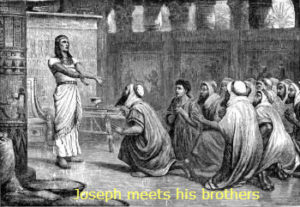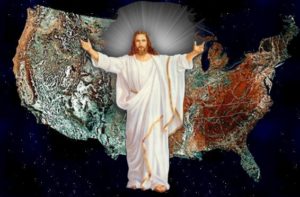As the story goes, just before two of the most important Old Testament figures passed away Jacob and then Moses both detailed what was to be for the descendants of each of the Twelve Tribes “in the Last Days”. Jacob spoke this to his assembled sons and grandsons in Egypt and Moses to the amassed tribes delivered from slavery under Pharaoh on the eve of their entering the “Promised Land” of Canaan some four centuries later. These passages are little taught from by either Judaic or Christian conventional Biblical scholars.The obvious reason is that if the Ten Lost Tribes are still among us today then the Birthright replacement theologies of the two major Biblical faith systems have no merit. The Jews are descendants of Judah, Benjamin and Levi and the vast majority of Christians claim no Abrahamic genetic linkage whatsoever. If the sons of Joseph are still around then they are the “Chosen People” and nobody else.
The Scriptural juxtaposition of these two passages make them of obviously great contextual import — and yet having listened intently to hundreds of hours of Bible teachings and read many scholarly Biblical treatises I had never come across them in a way to make me take any notice until I went on the search for the theme of the “Lost Tribes” that I chronicled in The Hidden Kingdom.
While the End Times characterizations for the other ten tribes are for the most part quite short and metaphorical in nature, the portions describing Judah and Joseph stand out:
It is written that Jacob said of Judah’s descendants,
Judah, thou art he whom thy brethren shall praise: thy hand shall be in the neck of thine enemies; thy father’s children shall bow down before thee.
Judah is a lion’s whelp: from the prey, my son, thou art gone up: he stooped down, he couched as a lion, and as an old lion; who shall rouse him up?
The sceptre shall not depart from Judah, nor a lawgiver from between his feet, until Shiloh come; and unto him shall the gathering of the people be.
Binding his foal unto the vine, and his ass’s colt unto the choice vine; he washed his garments in wine, and his clothes in the blood of grapes:
His eyes shall be red with wine, and his teeth white with milk.
(Gen. 49:8-12)
And of Joseph’s descendant’s he proclaimed,
Joseph is a fruitful bough, even a fruitful bough by a well; whose branches run over the wall:
The archers have sorely grieved him, and shot at him, and hated him:
But his bow abode in strength, and the arms of his hands were made strong by the hands of the mighty God of Jacob; (from thence is the shepherd, the stone of Israel:)
Even by the God of thy father, who shall help thee; and by the Almighty, who shall bless thee with blessings of heaven above, blessings of the deep that lieth under, blessings of the breasts, and of the womb:
The blessings of thy father have prevailed above the blessings of my progenitors unto the utmost bound of the everlasting hills: they shall be on the head of Joseph, and on the crown of the head of him that was separate from his brethren. (Gen. 49:22-26)
As we can see Judah is royalty, while Joseph’s descendants shall be a mighty, fruitful and bountifully blessed people according to blind and dying Jacob. Let me point out for those who haven’t realized, Jesus’s lineage is considered to be of the Tribe of Judah, which, in itself, fulfills this prediction of a perpetual lawgiver and king being of Judaic lineage — from the Christian standpoint, anyway.
Moses expanded on these themes for all the tribes in kind, except for Judah. Of Judah, Moses — who was about to be taken to his heavenly rewards — said,
And this is the blessing of Judah: and he said, Hear, Lord, the voice of Judah, and bring him unto his people: let his hands be sufficient for him; and be thou an help to him from his enemies. (Deut. 33:7)
Moses here seems to be pointing to suffering and persecution in store for Judah’s progeny in the End Times. But for Joseph it is very different:
And of Joseph he said, Blessed of the Lord be his land, for the precious things of heaven, for the dew, and for the deep that coucheth beneath,
And for the precious fruits brought forth by the sun, and for the precious things put forth by the moon,
And for the chief things of the ancient mountains, and for the precious things of the lasting hills,
And for the precious things of the earth and fulness thereof, and for the good will of him that dwelt in the bush: let the blessing come upon the head of Joseph, and upon the top of the head of him that was separated from his brethren.
His glory is like the firstling of his bullock, and his horns are like the horns of unicorns: with them he shall push the people together to the ends of the earth: and they are the ten thousands of Ephraim, and they are the thousands of Manasseh. (Deut. 33:13-17)
It is known that these Writings are at least nearly three thousand years old.
For the frontispiece of The Hidden Kingdom I have this passage from Deuteronomy on the right side of the page juxtaposed with the first stanza of America the Beautiful on the left:
Oh beautiful for spacious skies, for amber waves of grain,
For purple mountains majesties above the fruited plain.
America, America — God shed His Grace on thee,
And crown thy good with brotherhood
From sea to shining sea.
I find the two meshing together as if by dovetail joints.



{ 0 comments… add one now }